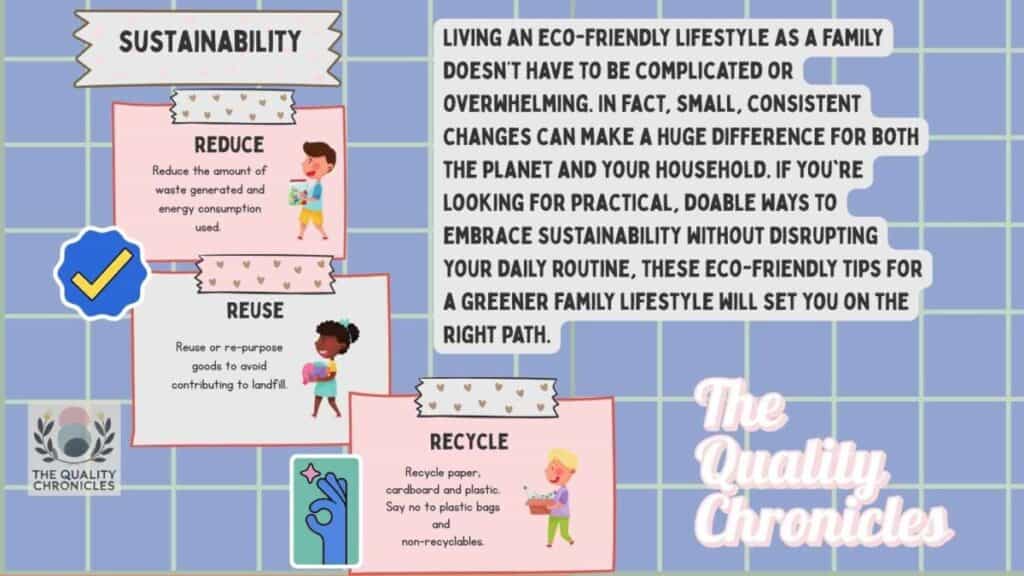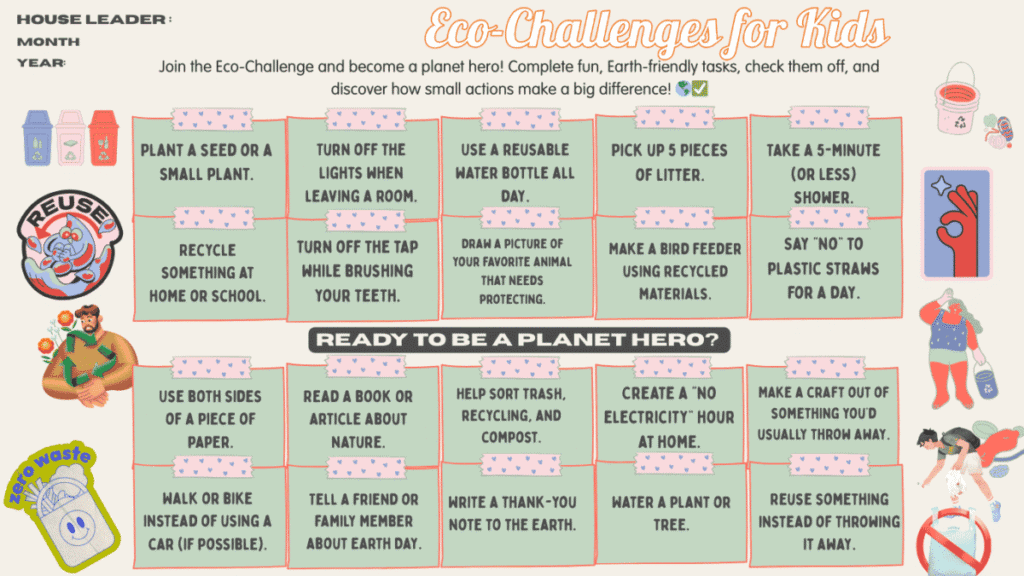You know that moment when your child scolds you for leaving the lights on? Or insists on bringing a reusable bottle because “plastic is bad for turtles”? Kids get it. They’re naturally curious, compassionate and wired to care. Raising eco-conscious kids isn’t about big-budget eco-makeovers. It’s about tiny, daily habits that add up to raising eco-conscious kids.
At The Quality Chronicles, we believe that sustainability starts at home—with muddy shoes, snack prep and lots of curious questions. This pillar post explores simple, age-appropriate ways to raise kids who care about the planet, one small habit at a time.

Start Young: Building Environmental Awareness from the Toddler Years
Even toddlers can learn to care for the world around them. It all begins with wonder:
- Sensory Nature Bins: Fill bins with leaves, pinecones, and smooth stones. Let them explore textures while you name them.
- Sorting Games: Create toddler-friendly recycling bins with images. Celebrate correct sorting like it’s a big deal (because it is).
- Weather Windows: Rainy day? Snowstorm? Use windows as discovery zones and explain nature’s rhythms with excitement.
- Scavenger Hunts: Turn walks into mini-nature missions—”Find one green leaf, one rock, and something fuzzy.”
Keep your messaging positive and joyful. Say “We help nature stay clean” instead of “Don’t litter.” Your energy becomes their education.
Home as a Nature-Loving Playground
By encouraging eco-conscious kids, keep your messaging positive and joyful. Say “We help nature stay clean” instead of “Don’t litter.” Your energy becomes their education in sustainability.
Your house speaks louder than any speech. Create eco-vibes through:
- Bringing the Outside In: Use indoor gardens, nature-themed art and wooden toys.
- Recycling & Compost Corners: Make these accessible and hands-on.
- Low-Waste Lifestyle Displays: Rotate toys, repair items together and verbalize smart choices: “We’ll borrow instead of buy.”
- Nature Touchpoints: Designate areas for rocks, shells, and feathers collected from nature adventures. Give them names and stories to make them memorable.
Normalize sustainability. Let your children grow up thinking that caring for the planet is just what we do.
Pointers for Parents to adapt Eco-Conscious Kids
You can’t outsource modeling eco-behavior. Here’s where your daily routines matter:
- Mornings: Take short showers, use reusable containers, turn off switches with your kids.
- Shopping: Read labels together. Choose reusable. Talk through what you buy and why.
- Meals: Grow herbs, use leftovers creatively, compost together.
- Energy Use: Set up a “power patrol” and use timers. Make it playful.
Celebrate wins. Laugh at slip-ups. The goal isn’t perfection—it’s progress.
Teaching Sustainability Through Routines to Raise Eco-Conscious Kids
Water Wisdom:
To nurture eco-conscious kids, you can’t outsource modeling eco-behavior. Here’s where your daily routines matter:
- Use cups for brushing teeth.
- Limit bathwater (and toss in fun bath toys).
- Challenge kids to “beat the 3-minute shower timer.”
- Appoint “leak detectives” to find drips.
- Collect warm-up water and reuse for gardening together.
Energy Champions:
- Create a “light guardian” role.
- Unplug devices together.
- Keep blinds closed in summer, dress warm in winter.
- Celebrate power-free family game nights.
- Use smart meters to track savings—and make it a family challenge!
Waste-Free Mealtime:
- Choose bulk over pre-packaged.
- Let kids pack snacks in fun reusable gear.
- Turn food scraps into compost and let them watch the magic.
- Encourage them to build their own recipes using leftovers.
Mindful Consumption:
- Plan shopping lists together.
- Start discount store treasure hunts.
- Choose experiences over things for birthdays.
- Embrace the “wait a week” test for non-essentials.
- Say no to plastics at least minimize the counts.
Nature Is the Best Teacher
Why Outdoor Time Matters for Eco-Conscious Kids:
- Improves focus, creativity, and emotional regulation.
- Boosts physical health and coordination.
- Strengthens their connection to nature—key for future advocacy.
Simple Ways to Reconnect:
- Weekly nature walks (same spot, all seasons).
- Backyard birdwatching stations.
- Mud kitchens and fort-building areas.
- Wildlife-friendly gardening with native plants.
- Create a seasonal nature calendar with your child.
Fun + Learning = Sustainable Habits That Stick
Recycled Crafts:
- Toilet roll bird feeders.
- Plastic bottle planters.
- DIY crayons from leftovers.
- No-sew tote bags from old t-shirts.
- Milk carton boats, CD mobiles, or jar lid art.
Eco-Games:
- Sorting races (compost/recycle/trash).
- Charades with environmental actions.
- Scavenger hunts with eco prompts.
- Board games with green themes.
- Create a “green family challenge jar” with weekly eco missions.
Books and Shows That Spark Action:
- The Lorax, The Curious Garden, We Are Water Protectors
- Octonauts, Wild Kratts, Planet Earth, Our Planet
- Talk about the stories together. Ask questions. Let kids lead the discussions.
Community Counts: Expand the Circle of Care
Local Initiatives:
- Join park cleanups.
- Help build butterfly gardens.
- Support community gardens.
- Start a schoolyard habitat project.
School Projects:
- Encourage joining green clubs.
- Help replace balloons with pollinator planting.
- Suggest eco-projects for homework.
- Ask the PTA to consider low-waste school events.
Family Volunteering:
- Beach cleanups
- Citizen science projects
- Tree planting
- Water testing
- Helping sort recyclables for local drives
Eco-Friendly Holidays:
- Celebrate Earth Day with hikes or cleanups.
- Ditch plastic decor for handmade items.
- Make sustainable gifting a family tradition.
- Turn birthdays into eco-themes (like garden party, beach clean, etc.)
Neighborhood Challenges:
- Litter pickup races
- No-waste lunch month
- Native plant swaps
- Eco-bingo for local kids
- Block-wide garage sale and swap day
Raising Eco-Conscious Kids Who Care
You don’t need to be perfect. Just consistent. Let your child’s natural curiosity guide you. Celebrate the small wins—like the first time they remind you to recycle that yogurt cup. The more joy you bring to eco-living, the more it sticks.
Raise eco-conscious kids not through fear, but through love, laughter and everyday wonder. Because sustainability isn’t a separate subject; it’s a way of living, especially for eco-conscious kids.
Next Steps? Download our printable “Eco-Challenges for Kids” checklist to get started this week—and turn everyday moments into lifelong values.

The Quality Chronicles: Where everyday choices shape a brighter tomorrow.
Encouraging eco-conscious kids to participate in community initiatives deepens their connection to sustainability.
Let your child’s natural curiosity guide you to raise eco-conscious kids. Celebrate the small wins—like the first time they remind you to recycle that yogurt cup. The more joy you bring to eco-living, the more it sticks for eco-conscious kids.
Frequently Asked Questions (FAQs)
What does it mean to raise eco-conscious kids?
It means teaching children to understand, care about, and actively protect the environment through daily habits, curiosity, and compassion.
At what age can I start teaching sustainability to my child?
You can start as early as toddlerhood! Even simple activities like sorting recycling or watering plants help build awareness.
What are some fun ways to teach kids about the environment?
Try crafts with recycled items, nature scavenger hunts, eco-themed games, or watching environmental shows like Wild Kratts or Octonauts together.
How do I make eco-friendly habits stick for kids?
Keep it fun, consistent, and part of everyday life. Celebrate efforts, involve them in choices, and model the behaviors you want them to adopt.
Can one family’s effort really make a difference?
Absolutely. Every small change counts—and when kids grow up with strong values, they influence others and create lasting impact.


